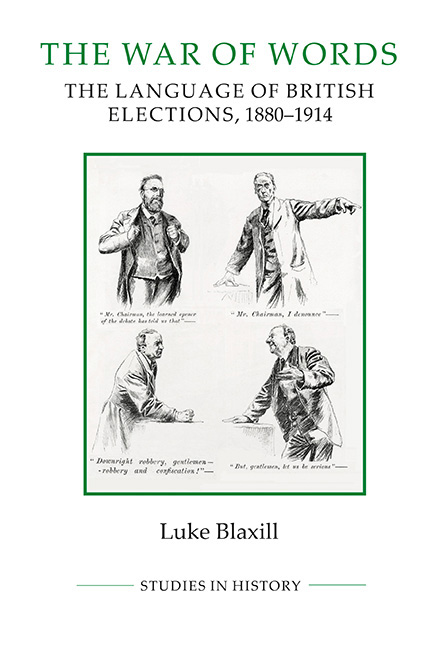Book contents
- Frontmatter
- Contents
- List of figures
- Acknowledgements
- Abbreviations
- Technical glossary
- Introduction : the challenge of reintegration in political history
- 1 On method : text-mining, corpora and the historical study of language
- 2 The impact of reform : the general elections of 1880 and 1885
- 3 The impact of home rule : the general elections of 1886 and 1892
- 4 The impact of imperialism : the general elections of 1895 and 1900
- 5 The impact of New Liberalism : the general elections of 1906 and 19101
- Conclusion: who won the war of words?
- Appendix 1 Technical and methodological
- Appendix 2 Statistical
- Bibliography
- Index
Introduction : the challenge of reintegration in political history
Published online by Cambridge University Press: 26 April 2020
- Frontmatter
- Contents
- List of figures
- Acknowledgements
- Abbreviations
- Technical glossary
- Introduction : the challenge of reintegration in political history
- 1 On method : text-mining, corpora and the historical study of language
- 2 The impact of reform : the general elections of 1880 and 1885
- 3 The impact of home rule : the general elections of 1886 and 1892
- 4 The impact of imperialism : the general elections of 1895 and 1900
- 5 The impact of New Liberalism : the general elections of 1906 and 19101
- Conclusion: who won the war of words?
- Appendix 1 Technical and methodological
- Appendix 2 Statistical
- Bibliography
- Index
Summary
‘Over a thousand candidates for Parliamentary honours, all speaking at the same time, asserting and denying, arguing or entreating, speaking not merely for days, but weeks, to audiences of hundreds of thousands.’
In the late nineteenth and early twentieth centuries party political platform speeches excited enormous enthusiasm. The years 1880–1914 in particular have widely been described as the ‘golden age’ of extra-parliamentary oratory and political engagement: an era where interaction between electors and parties was uniquely regular, verbose and influential. A typical candidate in a general election held between the Third Reform Act and the Great War often spoke at over a hundred meetings in a constituency campaign alone, meaning that – at a conservative estimate – at least half a billion words were uttered from platforms up and down the country. The opening quotation, taken from Henry Jephson's The platform, its rise and progress (1892), reflected the centrality of political stump oratory to the age. The platform had its critics: Jephson himself complained of ‘political oratorical pandemonium’ in 1888 and The Times in the same year bemoaned that ‘lamentations over the endless flow of verbiage are in vain’. However, Jephson also conceded that the platform was ‘the instrument by which liberty-loving people have won their freedom, without bloodshed or disorder’ and The Times similarly recognised the British ‘popular love of speech-making’.
While the public theatre and rumbustiousness of the hustings was a well established electoral tradition dating back to the Hanoverian period, British politicians did not fully embrace the platform until the Second Reform Act of 1867 which more than trebled the borough electorate by the early 1870s. In this respect, public speeches (and their thorough reporting in the local and national press) were by far the most powerful available tool for reaching the mass electorates of towns and cities. Indeed, by 1873, The Times recognised that ‘we have become a nation of public speakers … we are now more than ever a debating, that is, a Parliamentary people’. However, the emergence of the platform as a truly national and universal tradition was completed by the reforms of 1883–5. These measures sharply curtailed party expenditure and radically revised constituency boundaries as part of a drive towards single-member seats. Still more important, they extended the 1867 household franchise to the counties, effectively enfranchising the agricultural labourer.
- Type
- Chapter
- Information
- The War of WordsThe Language of British Elections, 1880–1914, pp. 1 - 20Publisher: Boydell & BrewerPrint publication year: 2020



